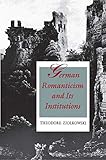German Romanticism and Its Institutions / Theodore Ziolkowski.
Material type: TextPublisher: Princeton, NJ : Princeton University Press, [2022]Copyright date: ©1990Description: 1 online resource (454 p.)Content type:
TextPublisher: Princeton, NJ : Princeton University Press, [2022]Copyright date: ©1990Description: 1 online resource (454 p.)Content type: - 9780691225760
- German literature -- Social aspects
- German literature -- 18th century -- History and criticism
- German literature -- 19th century -- History and criticism
- Literature and society -- Germany
- Romanticism -- Germany
- HISTORY / Europe / Germany
- Adams, Frank Dawson
- Albertus Magnus
- Allgemeines Landrecht
- Arminius
- Auhuber, Friedhelm
- Ballard, Lloyd Vernor
- Bartholdy, Jakob Salomon
- Becker, Wolfgang
- Benjamin, Walter
- Beutler, Christian
- Boumann, Johann
- Brentano, Christian
- Brentano, family of
- Brotherhood of Saint Luke
- Calov, Gudrun
- Charlemagne
- Chodowiecki, Daniel
- Creuzer, Friedrich
- Darwin, Erasmus
- Dilthey, Wilhelm
- Dohna, Alexander von
- Eichendorff, Wilhelm von
- Eisenstadt, Shmuel N
- Emmerick, Anna Katharina
- Farmer, Paul
- Frankfurt School
- Friedrich II, Emperor
- Goethe, August von
- Goya, Francisco
- Hagen, Friedrich von der
- Hebbel, Friedrich
- Holger the Dane
- Imperial Chancery
- Industrial Revolution
- Jean Paul
- Jetter, Dieter
- Kant, Immanuel
- Laroche, Karl von
- Levin, Harry
- Lorenz, Emil Franz
- Malerroman
- Manu
- Napoleon
- Novalis
- Ovid
- Parsons, Talcott
- Plato
- Rauch
- Reil, Johann Christian
- codification controversy
- generation on stones
- natural law
- oration: as mode
- 830.9/145 23
- online - DeGruyter
| Item type | Current library | Call number | URL | Status | Notes | Barcode | |
|---|---|---|---|---|---|---|---|
 eBook
eBook
|
Biblioteca "Angelicum" Pont. Univ. S.Tommaso d'Aquino Nuvola online | online - DeGruyter (Browse shelf(Opens below)) | Online access | Not for loan (Accesso limitato) | Accesso per gli utenti autorizzati / Access for authorized users | (dgr)9780691225760 |
Frontmatter -- CONTENTS -- PREFACE -- CHAPTER ONE The Institutional Approach -- CHAPTER TWO The Mine: Image of the Soul -- CHAPTER THREE The Law: Text of Society -- CHAPTER FOUR The Madhouse: Asylum of the Spirit -- CHAPTER FIVE The University: Model of the Mind -- CHAPTER SIX The Museum: Temple of Art -- CHAPTER SEVEN Conclusion -- NOTES -- EDITIONS CITED -- INDEX
restricted access online access with authorization star
http://purl.org/coar/access_right/c_16ec
Using an illuminating method that challenges the popular notion of Romanticism as aesthetic escapism, Theodore Ziolkowski explores five institutions--mining, law, madhouses, universities, and museums--that provide the socio-historical context for German Romantic culture. He shows how German writers and thinkers helped to shape these five institutions, all of which assumed their modern form during the Romantic period, and how these social structures in turn contributed to major literary works through image, plot, character, and theme. "Ziolkowski cannot fail to impress the reader with a breadth of erudition that reveals fascinating intersections in the life and works of an artist. He conveys the sense of energy and idealism that fueled Schiller and Goethe, Fichte and Hegel, Hoffmann and Novalis."--Emily Grosholz, The Hudson Review "[This book] should be put in the hands of every student who is seriously interested in the subject, and I cannot imagine a scholar in the field who will not learn from it and be delighted with it."--Hans Eichner, Journal of English and Germanic Philology "Ziolkowski is among those who go beyond lip-service to the historical and are able to show concretely the ways in which generic and thematic intentions are inextricably enmeshed with local and specific institutional circumstances."--Virgil Nemoianu, MLN
Mode of access: Internet via World Wide Web.
In English.
Description based on online resource; title from PDF title page (publisher's Web site, viewed 02. Mrz 2022)


